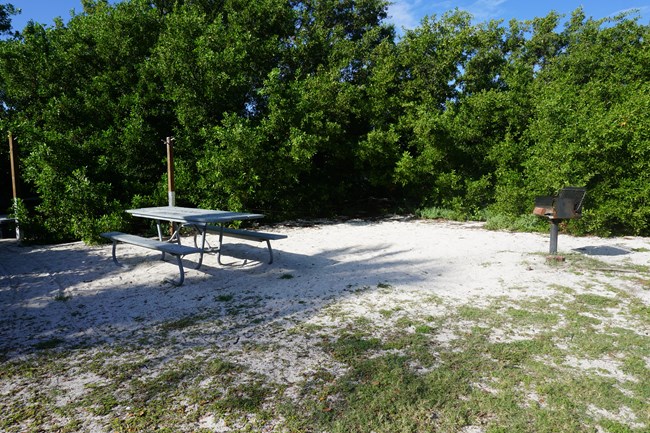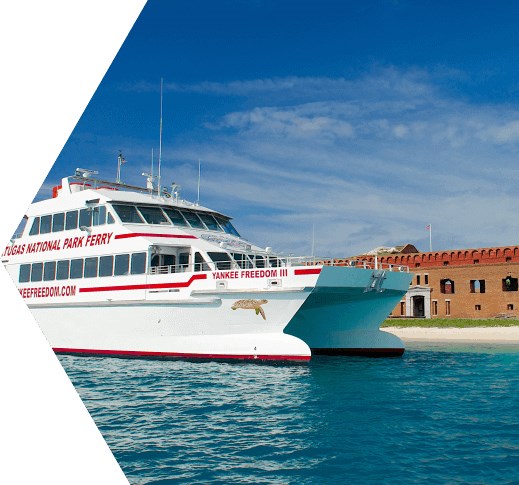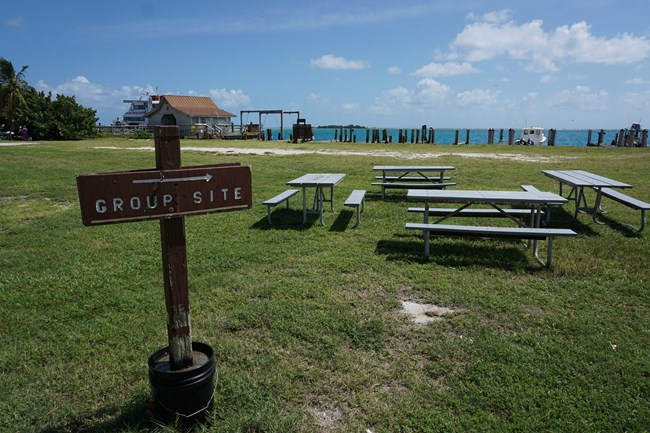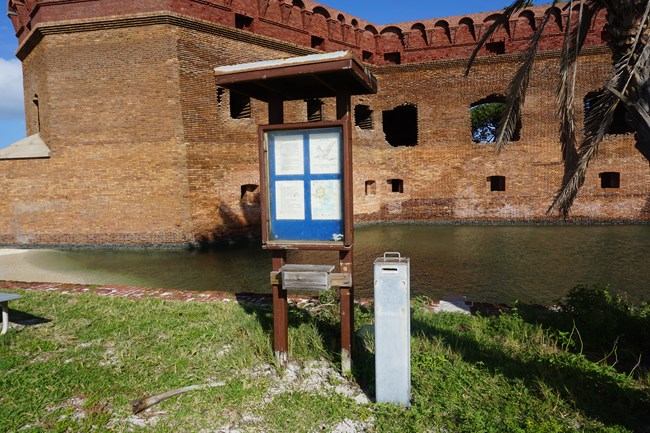Which National Park Will You Find The Garden Of Eden
Plan Your Garden Key Camping Experience
Camping at Garden Key is an incredible experience with amazing star gazing, snorkeling, sunsets, and more! But you must be prepared to camp in this remote location. To assist you in your planning, be sure to review the information on this page to learn more about camping at Dry Tortugas National Park.
Camping transportation is limited to private vessel, permitted tour guides, or commercial ferry. Reservations on the Yankee Freedom ferry are limited and sell out months in advance. Once you arrive at Garden Key, camping is first come, first served for all regular sites (up to 6 people). All camping fees are paid on Garden Key and all groups of 10-20 require an advance reservation with the Park.

What to Bring and Know
Campsites at Dry Tortugas are available only on Garden Key, where Fort Jefferson resides. Careful planning is essential to enjoy your visit to Dry Tortugas National Park.
Campsite Information
A primitive campground is located on Garden Key and is a short walk from the public dock.
- Reservations are not accepted for the 6-person sites. All campers, once they arrive, will be guaranteed a place to camp.
- The individual sites can each accommodate up to three 2-person tents (total of 6 people), and are available on a first-come, first-served basis.
Choosing Your Campsite
Reservations are not accepted for the 6-person sites. All campers, once they arrive, will be guaranteed a place to camp.
When you arrive:
- Look for a table in the campground with a stenciled number. Only those tables with numbers are assigned to campsites.
If all regular sites are occupied:
- Should you find all eight regular sites occupied, you must share the overflow area with other campers. The overflow area is a grassy area near the regular campsites.
- Tables and grills are provided in overflow sites, but they must be shared with other overflow campers. As campers leave, you may move to a regular site if one becomes available.
Campsite Facilities
Campers must bring all supplies, including a tent, fresh water, fuel, ice, and food. All trash and garbage must be carried out upon departure.
Gas camping stoves or charcoal briquettes placed in campsite BBQ units are the only fires allowed. (IMPORTANT: If you are planning on arriving with the ferry, compressed gas canisters are not allowed onboard. Plan on bringing charcoal for grilling.)
Campsites include:- Picnic Tables
- Elevated grills for charcoal fires
- Hooks to keep items above the ground
-
Toilets: Composting toilets are located in the campground. The composting toilets are closed from approximately 10 a.m. to 3 p.m. During these hours, please use the facilities aboard the commercial ferry boats at the dock.
-
Showers: There are no public showers in Dry Tortugas. When the ferry is docked at Garden Key, visitors are welcome to use their fresh water rinse (no soap allowed).
-
Electricity / Internet / Cell Service: There are no public wifi, cellular service, or electric hook-ups. Plan to bring battery-powered appliances as needed.
Camper's Supply Checklist
- Food and Water: We recommend two gallons of water per person per day (remember the heat). Bring an extra day's supply of food and water in case of ferry cancellations. Bring food items in hard-sided containers for protection from rats and crabs. Posts are available to hang food and trash.
- Shelter: Tent (required), sleeping bag and pad, and strong stakes for the frequent high winds.
- Cooking: Match-light charcoal for campground grills (fuel is not permitted aboard ferries), waterproof matches and lighter, cooking utensils, biodegradable soap, and trash bags.
- Clothing: Cold and warm-weather clothing, rain gear, lightweight long-sleeve shirt and pants for sun and bug protection, wide-brimmed hat.
- Personal Equipment: Medications, first-aid kit, knife, flashlight with spare batteries, snorkel gear, binoculars, sunglasses and sunscreen, insect repellent, and personal items. Private boaters and paddlers require additional safety gear.
Campground Regulations
- Space is Limited. Each of the regular campsites contains a table, post for hanging food, and a BBQ grill. Three tents and six campers are the maximum allowed per campsite. All equipment must remain within ten feet of your table.
- Protect Park Vegetation. Trees and shrubs are crucial to provide some shade and wind break. Help protect this valuable vegetation. Do not attach anything to campground trees (but clothes line may be strung between posts). All camping gear must be free standing. Respect closed areas of the park.
- No Wood Fires. Charcoal briquettes placed in campsite BBQ grills are only fires allowed. Gas camping stoves are permitted by the park, but commercial ferries do not permit them on board.
- Toilets. Composting toilets are located in the campground. Waste is composted in the equipment below the units. These systems are very fragile and are designed only for the disposal of human waste and toilet paper. Please do no put trash, food scraps, or other items in these toilets. Please lower toilet lids when not use in use to reduce odor and aid in the composting process.The composting toilets are closed from approximately 10 a.m. to 3 p.m. During these hours, please use the facilities aboard the commercial ferry boats at the dock.
- Grey Water. Grey water from dishwashing, etc. should go below the high tide line at the dinghy beach.
- Protect Your Food. Rats have inhabited the Tortugas probably since the arrival of humans. Though the size of the rat population is controlled, rats may be encountered as they forage through campsites looking for food. The only reliable way to protect your food and prevent damage to your gear is to store your food and food trash in hard-sided containers. Rats will chew through tents or backpacks if they smell food, and can also climb the provided hanging posts.
- Kayaks and Other Watercraft. You may keep boats in your site or on the shore near the designated dinghy beach. Boats of all kinds are prohibited in the swim area. Boats may only be launched from and landed on the designated dinghy beach, which is located near the government docks. Remember to wear a life jacket at all times while boating.
- Quiet Hours. Please be considerate of others and observe quiet hours from 10 p.m. to 6 a.m. The use of bright lanterns is also discouraged during these hours.
- Access to Fort Jefferson. One of the great pleasures of any visit to the park is the opportunity to explore Fort Jefferson. Be careful inside the fort. Many areas have uneven walking surfaces. The fort is open sunrise to sunset, or to contact a ranger in an after-hours emergency. The moat wall, beaches, and other exterior public area remain open after dark.
Departure
On the day of departure, plan to:
- Completely clear your campsite.
- Place all camping gear on the main dock.
- Return all hand carts to the dock by 10 AM.
If you are traveling with the ferry:
- Wait until the ferry off-loads passengers and equipment the morning of your departure.
- See the captain for instructions on loading your gear.
- If you want to enjoy the island before leaving, be sure to keep any items you will need for the day in the day use area.

Transportation: Plan Ahead!
Transportation for campers is limited to private vessels, daily commercial ferry, and permitted tour guides. The seaplane does not offer transport for campers.
Ferry Transportation
The ferry can bring campers and their gear to the Dry Tortugas. You should check with the ferry operator for details on what they will transport by calling them at 1-800-634-0939. Once you arrive, there are wheeled carts at the dock to assist in moving your camping gear to the campground.
- Note that the ferry is limited to 10 camping passengers per day. Due to the limited number of spots on the ferry, we recommend booking your trip months in advance, especially during the winter holidays and winter season that tends to be busier, as visitors from northern chilly climates head to South Florida sunshine.
- If you arrive at the park with the daily commercial ferry, you will have a spot to camp. Garden Key is a small island, but we'll work at finding a place for you to pitch your tent - and you must have a tent to camp.
Learn more about the ferry by visiting their website.
Private Vessels
Private vessels should check in with a ranger upon arrival at Garden Key for camping information and vessel anchoring areas. Overnight anchoring is allowed in the area of sand and rubble bottom within 1 nautical mile of the Fort Jefferson harbor light and must not block any designated channel.
- Overnight anchoring is not permitted at any other location in Dry Tortugas National Park.
- Upon arrival, the wheeled carts on the dock can be used to assist in moving your camping gear from your vessel to the campground.
Plan your boating trip carefully by visiting our Boating page.

Group Campsite Reservations
A group site is available for 10-20 people and must be reserved in advance.
Group Site Facilities
The group site contains:
- Two grills
- Two picnic tables
- A space large enough for 12-15 tents.
How to Reserve a Group Campsite
Please e-mail us for inquiries about the Garden Key Group Campsite. For a Group Campsite Reservation Application, click here.
- All applications should be emailed to the email address at the bottom of the form.
- Groups of 10 or more arriving without a reservation will not receive exclusive use of the group site.

Camping Fees
Campsite fees are not included in transportation fees (such as the ferry or permitted guides).
Campsite Fees
The campground is a self-service fee area with a nightly fee of:
- $15 per night, per individual site
- $30 per night for the group site
How to Pay Camping Fees
Once you arrive to the island, a park ranger will direct you to the camping fee station.
Important Fee Reminders:
-
Fees can only be paid as cash or check.
-
Credit / Debit cards are not accepted.
Discounts for Camping Fees
You must bring your pass and a valid ID with you to qualify for the discount. The National Park Service does not keep a register of passes issued.
A 50% discount applies to holders of the:- Senior Pass (Formerly known as the "Golden Age Pass")
- Access Pass (Formerly known as the "Golden Access Pass").
No other discounts apply.
Frequently Asked Questions
Can I reserve a campsite in advance?
Reservations are not accepted for the regular 6-person campsites. Regular campsites are first-come, first-served only. The only campsite that can be reserved in advance is the group site for 10-20 people. Please refer to the Group Campsite Reservations section for information on how to reserve the group site.
Can I rent a boat, kayak, or buy supplies at the park?
There are no rentals or supplies for sale once you arrive. Careful planning is essential, including bringing all your food, water, and supplies with you.
Can I build a fire from wood instead of bringing charcoal?
No. No wood fires are allowed from collecting driftwood or bringing firewood. Charcoal briquettes placed in campsite BBQ grills are only fires allowed. Gas camping stoves are permitted by the park, but commercial ferries do not permit them on board.
What do I do with my trash?
All trash and garbage must be packed out. There are no public trash or recycling areas anywhere in Dry Tortugas.
Can I camp without a tent?
No, due to the presence of wildlife on the island, tents are required in order to camp.
Can we use the group campsite if it is not reserved that night?
Yes. During periods of heavy use, the group campsite may be used for overflow camping, but only on unreserved nights. Any unreserved group choosing to camp in the group site must move out of the group site by 10 a.m. any day the group site is reserved. Reservations are posted on the board located in the group campsite.
Is fishing allowed in the park?
Yes! With its abundant marine life, Dry Tortugas is an excellent fishing destination. However, please do not plan on catching your meals. Bring enough food, water, and supplies for your entire stay.
Important things to know:
- "J" hooks are not allowed. Plan to arrive with "circle hooks".
- Spearfishing and the collection of lobsters is prohibited.
- Florida Saltwater fishing license is required, unless you are under the age of 16 or a Florida resident senior over the age of 65.
- Fishing is allowed only in certain areas.
Learn more about fishing regulations at the park by visiting our Fishing page.
Can I camp if I am taking the seaplane?
No. The seaplane does not offer transport for campers, due to the added weight of the gear.
Is there a public shuttle to get to Loggerhead Key?
No. There is no public transportation to this island. Access is limited to private vessels or kayak/canoes brought to the park via the ferry. If you bring your own kayak/canoe to the park on the ferry, you'll need to make advance arrangements due to the limited capacity on the boat.
Which National Park Will You Find The Garden Of Eden
Source: https://www.nps.gov/drto/planyourvisit/camping.htm
Posted by: smithockly1984.blogspot.com

0 Response to "Which National Park Will You Find The Garden Of Eden"
Post a Comment